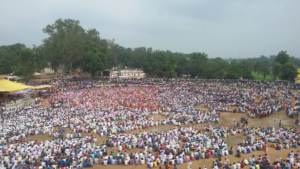

Other Access to Justice Surveys-Part 1
Guest post by Krithika Gururaj
Similar to DAKSH’s ongoing Access to Justice survey, there have been surveys conducted in various countries focusing on different aspects of the judicial system and in particular the public’s perception of the judiciary.
 Reference: Pleasence, P., Balmer, N., and Sandefur, R. 2013, Paths to Justice: A Past, Present and Future
Reference: Pleasence, P., Balmer, N., and Sandefur, R. 2013, Paths to Justice: A Past, Present and Future
The UK’s Paths to Justice Survey was conducted in the year 1997 by Prof Dame Hazel Genn. It was commissioned by the Nuffield Foundation with the intention of gathering information about the public’s experience and perception of legal problems – ‘the client perspective’ and possible resolutions. The survey was conducted on a sample group from England and Wales, with the research subsequently extending to Scotland when the Paths to Justice Scotland survey was commissioned. The landmark Paths to Justice Survey has resulted in several other countries adopting a similar survey approach to assess their judiciary.
The survey brought to light structural factors impeding access to justice, such as costs, procedures, and lack of knowledge. The survey provided unique data on the public’s experience of the justice system, transformed understanding of the system, and shaped subsequent government policies based on the legal needs of citizens. Further research stemming from the survey has assessed effects of the aforementioned factors on the formal institution of the justice system. The Paths to Justice Survey is currently funded by the UK’s Ministry of Justice as a continuous panel study.
Of vital importance is the incorporation of survey findings in the policy processes of the UK government in the design and delivery of legal services. The survey has also influenced expenditure on legal aid through the Legal Services Commission in the UK and has been incorporated into various English and Welsh government publications. The survey report was initially used to drive and support policy change. The Constitutional Select Committee’s reports in 2004 and 2005 on legal aid matters used the survey findings extensively, as evidence to support or defend the government’s position. However, by 2011, the findings were increasingly being used by non-state actors to criticise government policy.
The survey has transformed understanding of public justice needs and influenced the way legal services are delivered in the UK. We look forward to DAKSH’s Access to Justice Survey having a similar profound influence on the Indian justice system.
Reference: Pleasence, P., Balmer, N., and Sandefur, R. 2013, Paths to Justice: A Past, Present and Future
Krithika Gururaj is currently an intern at DAKSH India and a candidate for Master’s in Public Policy from the Crawford School of Public Policy at the Australian National University in Canberra.
The views expressed in this article are solely those of the author’s and they do not represent the views of DAKSH.

Krithika Gururaj
RECENT ARTICLES


POLITICAL MANIFESTOS AND JUDICIAL REFORMS

Challenges in NCLT Filing Procedures: Advocates’ Perspectives

Beyond Revenue – Reimagining Court Fee As A Policy Tool For Judicial Administration

-
Rule of Law ProjectRule of Law Project
-
Access to Justice SurveyAccess to Justice Survey
-
BlogBlog
-
Contact UsContact Us
-
Statistics and ReportsStatistics and Reports
© 2021 DAKSH India. All rights reserved
Powered by Oy Media Solutions
Designed by GGWP Design